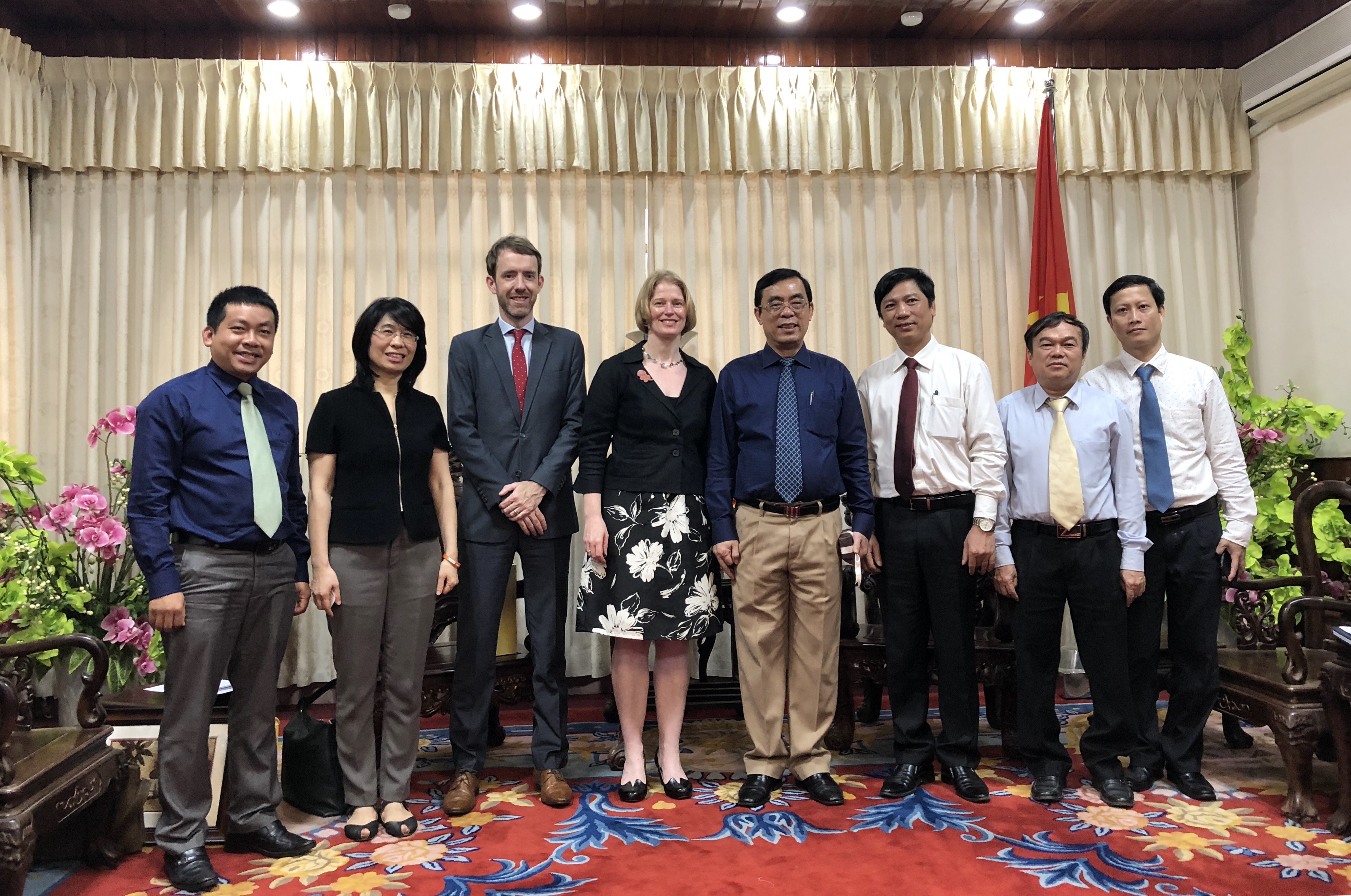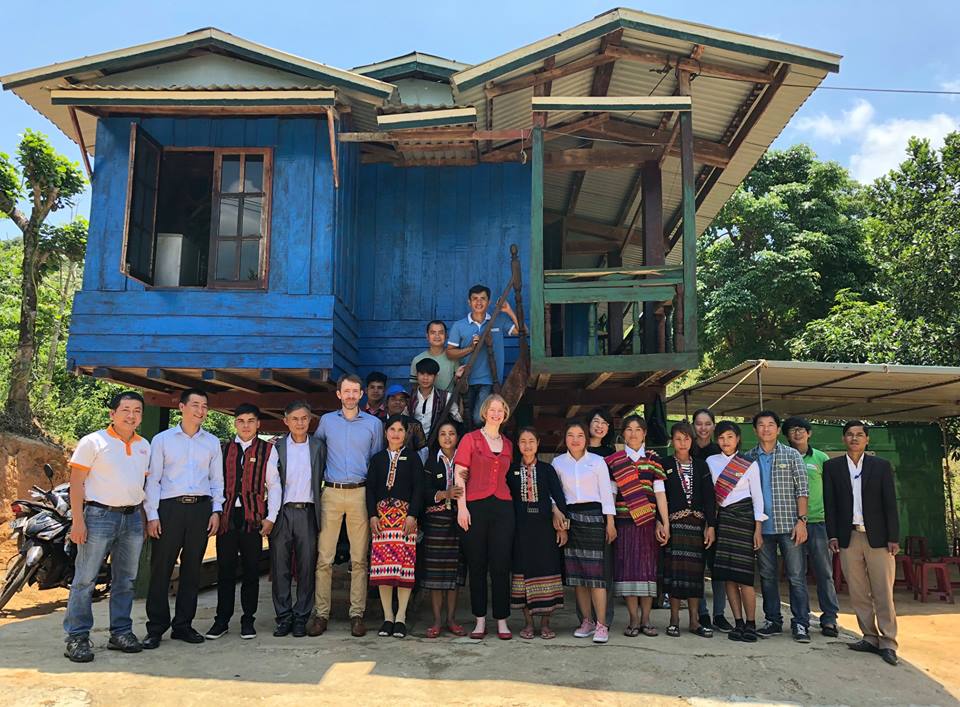World Vision Vietnam and New Zealand Embassy joined hand to improve Huong Hoa ethnic minority farmers’ lives in Quang Tri Province
Hướng Hoá, Quảng Trị – On 19 April, World Vision Vietnam’s National Director Tran Thu Huyen and New Zealand Ambassador to Vietnam, H.E Wendy Matthews visited the implementation area of the Ethnic Minority Economic Empowerment (EMEE) Project in Huong Hoa district, Quang Tri. During the visit, the delegation met with representatives of local authorities and the project’s direct beneficiaries.
EMEE project is an innovative collaboration between World Vision and New Zealand Aid Programme’s Partnerships Fund to create a solid foundation for ethnic minority communities in Huong Hoa, one of the poorest district in Quang Tri province. EMEE project aims to improve the economic well-being of 1,200 ethnic minority households in Quang Tri province, using market facilitation, savings schemes, sustainable farming techniques, business development and public or private partnerships. World Vision is leading implementation of this five-year $2.8 million initiative, supported by the New Zealand Aid Programme.
The project has employed a Local Value Chain Development approach, which helped vulnerable producers and farmers analyze markets, gain information, build relationships with buyers, and act collectively to overcome market barriers and increase profits through forming groups and training. The project has covered both the technical (e.g., which crops to grow) as well as the human (e.g., value of working as a group, collaboration with other parts of the value chain) dimensions.Besides, it has also introduced the communities to the Accumulating Savings and Credit Associations - a mechanism to start saving and access loans in a safe, reliable, and affordable way.
“With the application of new technologies and farmers’ better understanding of the causal link between product quality and stable income, the quality of local agroforestry products, especially coffee beans has been significantly improved. When the credibility is enhanced, Huong Hoa coffee products have gradually become more attractive in the coffee market and now are being purchased at prices higher than market rate and exported to European countries such as Germany, Italy, and the Netherlands,” said Hoang Duc Quyen – EMEE Project Manager.
To date, estimated 1,200 poorest households have directly benefited from the project through their participation in 52 Producer Groups that the project had supported to establish. All 3,448 households in the six project communes have also gained indirect assistance through the exchange of information, knowledge and experience with specialists in relevant areas.
New Zealand Ambassador to Vietnam Wendy Matthews shared her thoughts at the project: “New Zealand has been supporting the agriculture sector in Vietnam through our Aid Programme for many years. New Zealand is one of the world’s leading countries in terms of agriculture. Through innovative yet simple processes and technologies, New Zealand hopes that we can support Vietnam with smart solutions that make a positive impact on farmers’ lives.”
During the visit, World Vision Vietnam’s National Director Tran Thu Huyen stated: “The collaboration between World Vision and New Zealand Aid Programme’s Partnerships Fund within the framework of the EMEE project has opened new doors to future endeavors to reduce economic vulnerability among ethnic minority communities, especially women. It also creates opportunities for all groups in society, including businesses, local governments, technical specialists, and farmers to work together with a common goal of ending poverty in Vietnam. Hopefully, all this eventually will help address the issues of children’s malnutrition in Huong Hoa.”
Background information:
Huong Hoa district has the highest poverty rate in Quang Tri province (21.39%)[1]. Thirteen out of twenty communes in the district suffer from poverty at a rate higher than 50%[2], with a large proportion of the population being ethnic minority. These levels of poverty have led to significant issues around food security and child malnutrition among the Van Kieu and Pako people. This is due to the lack of economic development opportunities, including poor infrastructure, limited knowledge on effective production processes, weak supply-chain connections, volatile price fluctuations, lack of access to capital, and restricted accessibility due to the remote locations of these communes.
About the New Zealand Aid Programme:
New Zealand’s Aid Programme provides development assistance in areas of New Zealand’s strength and Vietnam’s priority, sharing the best of New Zealand’s knowledge, skills and technology. New Zealand supports Vietnam to grow its agriculture sector, develop a more highly skilledand educated workforce, as well as building Viet Nam’s resilience to disasters. New Zealand will invest approximately NZ$29 million in the three years to July 2018.
About World Vision:
World Vision is a Christian relief and development humanitarian organisation, working to improve the quality of life of people, especially children, who are marginalised and living in poverty. World Vision helps all who are in need regardless of their religion, race, ethnicity or gender.
World Vision started working in Vietnam with emergency relief assistance in 1988 and opened an office in Hanoi in 1990. Since 1990, World Vision has implemented many relief and development programs, partnering with the Vietnamese government, other non-governmental organisations and communities. World Vision's long-term development programs are currently operated in 37 districts of 14 cities and provinces throughout Vietnam.
Contact:
World Vision: Ngo Thu Tra | Media Relations Officer
Email: ngo_thu_tra@wvi.org Tel: +84 125 468 5137
New Zealand Embassy in Vietnam: Nguyen Ngoc Tram| Communications and Public Affairs Adviser
Email: Tram.Nguyen@mft.net.nz Tel: +84 912 893 964

